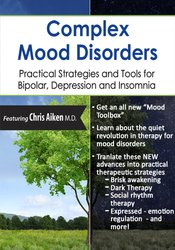

Therapy is taking front-and-center stage in the treatment of bipolar and depression, and this seminar will bring you up-to-date on the advances your clients need most. We’ll draw from over half a dozen evidenced-based therapies, including:
We’ll pull together the common elements in these therapies to create a single, flexible toolkit that you can adapt to the unique needs of each client.
You’ll learn how modern-life is contributing to mood disorders by changing the environment we live in. Blue-light from electronic devices can alter neurohormones in ways that cause depression, insomnia, and obesity. We’ll explore the effects of diet, seasons, light, temperature, and air-quality on sleep and mood. We’ll also look at ways that technology can aid recovery, including dawn-simulators, blue-light filters, sleep actigraphy, and specific apps for mood disorders.
We’ll explore the unique ways that bipolar and depression impact relationships and how to address those in therapy. Finally, you’ll learn how to work with families to reduce conflict and foster a more supportive environment for recovery during mood episodes.
This online program is worth 5.25 hours CPD.
| File type | File name | Number of pages | |
|---|---|---|---|
| Manual ZNM052105 (51.41 MB) | 190 Pages | Available after Purchase |

Chris Aiken, MD, is a psychiatrist and psychotherapist whose work focuses on natural and lifestyle approaches to mood disorders. He is the director of the Mood Treatment Center, Editor-in-Chief of The Carlat Psychiatry Report, the bipolar Section Editor for Psychiatric Times, and an instructor at the Wake Forest University School of Medicine. He hosts the weekly Carlat Psychiatry Podcast with Kellie Newsome, PMH-NP.
Dr. Aiken’s interest in mood disorders came from experience with close friends who suffered from depression. He began his career as a research assistant at the National Institute of Mental Health and went on to complete medical school at Yale and residency at Cornell and Duke Medical Centers. He remains active in research, and his work has appeared in peer-reviewed journals and books. He lives in North Carolina with his wife Lisa and twin children, David and Eleanor.
Speaker Disclosures
The Mood Spectrum
Circadian Rhythms
Sleep and Mood
Mood and Health
Medication
Cognition: The Silent Symptom
Mood Disorders in the Family
| 5 |
|
| 4 |
|
| 3 |
|
| 2 |
|
| 1 |
|
Satisfaction Guarantee
Your satisfaction is our goal and our guarantee. Concerns should be addressed to info@pesi.co.uk or call 01235847393.
Please wait ...